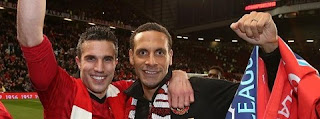Having ridden out the media storm that followed his arrival at Old Trafford, David De Gea has been one of United’s leading lights in the successful recapturing of the Barclays Premier League title.
Young, slender and bequiffed, De Gea was a soft target for criticism when he arrived at Old Trafford almost two years ago. Now, having played his part in a defensive overhaul that has taken United to the Premier League title, very little gets past the gifted Spaniard. Still only 22 and fresh from his first call-up to Spain’s senior squad, De Gea has cooled burning scrutiny with his icy nerve and, armed with a poker face and a surfeit of talent, United’s No.1 has infected everyone with his contagious calm.
“David has developed and matured as the season has gone on,” Sir Alex Ferguson said last month. “It’s like a young kid taking his first steps forward. He wobbles, gets up, wobbles, gets up again and eventually he walks. The boy is walking now.”
Walking tall, too. In 2013, De Gea has conceded just five Barclays Premier League goals, keeping clean sheets in eight of 12 matches as the Reds have curtailed the procession of concessions that scattergunned the first half of the campaign. While that madcap approach still yielded results – the Reds ended 2012 seven points clear at the head of the table – the remainder of the campaign has mercifully been a far more composed stomp towards success – just how De Gea likes it.
From an early age, quiet confidence has been the youngster’s hallmark. Before his unexpected debut at 18 for Atlético Madrid as substitute for injured Roberto – himself a deputy – David had already won over manager Abel Resino. “I spoke to him about it,” Resino recalled. “He said to me: ‘I’m better than all the other goalkeepers here. I’ll get in the first team here.’ There was something I liked about him. There was assuredness, security. It wasn’t arrogance, it was conviction.” That conviction prompted Atlético to pull the plug on a deal to send De Gea out on loan to Wigan Athletic; those at the Estadio Vicente Calderon knew they had a unique prospect on their books.
“People were talking about Joel Robles as the prominent goalkeeper coming through their ranks,” says As journalist Guillem Balague. “Atlético Madrid went along with that to protect De Gea as they knew that he was something special. As soon as he came into prominence everyone saw his potential and there was no doubt that he was going to go far. He had one or two things that made him really special; one was that calmness that he has in big games, which really served him well when it was needed.”
A star in high-profile games against Barcelona and Real Madrid, in addition to Atlético’s successful Europa League run of 2009/10, De Gea’s twinkling talent caught the eye of United and he was enlisted to replace the departed Edwin van der Sar. The 40-year-old’s legacy could not have been more imposing: a four-time champion, having just featured in his third Champions League final in four years, but Sir Alex, having passed up the chance to sign both Petr Cech and Joe Hart in their formative years, didn’t want to risk missing out for a third time on one of goalkeeping’s hot prospects.
Nevertheless, De Gea’s arrival provoked an outbreak of the numbers game among the British media. Half van der Sar’s age, history’s second-most expensive goalkeeper, but the Spaniard merely shrugged: “It doesn’t interest me. They are numbers, clauses, prices. The value that really counts is that which is shown on the pitch, not what they say your value is. I’m interested in what people think of me on the playing field.” He didn’t have to wait long to find out.
Beaten by Edin Dzeko’s speculative effort in the Community Shield and Shane Long’s altogether tamer shot in United’s Premier League opener at the Hawthorns, the Spaniard was quickly targeted by trigger-happy critics. “The goalkeeper is like a jelly,” said one experienced scribe. “I can’t see what he’s got. How on earth Ferguson and all his millions of coaches could have watched this boy week-in, week out and then signed him I just don’t know.”
“There isn’t much analysis of the Premier League in Spain,” says Balague, “but there is a lot of reaction to what the reaction is. They took note of what was being said about De Gea, and it surprised people because they knew a goalkeeper that was really special. At first, people in England didn’t know what United had in their hands, and once you get a cliché in somebody’s head, that’s it. I saw a lot of well-known people comparing him to Massimo Taibi after two games. This is a player who – alongside Valencia’s Vicente Guaita – is the future of Spanish goalkeeping.”
The Spaniard shared goalkeeping duties with Anders Lindegaard throughout the first half of De Gea’s maiden season in England, until an ankle injury forced the Dane onto the sidelines. Less than a week later, De Gea enjoyed a watershed moment in his United career. Having reeled Chelsea in from a three-goal deficit to level at Stamford Bridge, United’s share of the spoils was preserved by a staggeringly athletic fingertip save from De Gea to flick away Juan Mata’s injury-time free-kick.
“From a personal perspective that was important,” the stopper later admitted. “When you look back over a season there are lots of defining moments and key goals. Particularly from a personal point of view, the fact the save was right in the last minute was decisive. Possibly it gave me a huge confidence boost as well.”
Though his debut campaign ended on a collective low, De Gea finished 2011/12 imbued with invaluable experience of life in England. His start to the current campaign was again interspersed with spells on the sidelines, but since last December he has been a virtual fixture in Sir Alex’s defensive unit. The highlights have been numerous, but none match a superb display of dexterity and reflexes in the draw at Real Madrid. Even then, much attention was afforded to his unorthodox decision to fend away a Fabio Coentrao shot with his right boot, rather than his hands.
“Like always when someone tries something new, people say: ‘You’re wrong. For a hundred years we did it this other way,’” says Balague. “He uses his feet for saves, sometimes with his feet elevated to the same height as his hands, which has created a bit of controversy in England, but I think he may be onto something here. There’s a lot of intuition and preparation in it. He told me that if he sees that a save with the hands is not going to have enough power, the foot will always take the ball away from the danger area. David does it systematically as part of his weaponry.”
On inspection, it’s a well-stocked armoury. Even in such a short career, De Gea’s strengths are well established. Exceptional reflexes and handling, spring-loaded athleticism and immaculate distribution contrive to make him a prototypical modern goalkeeper, but it is in the Spaniard’s previous areas of weakness that his strengthening is most apparent. More decisive and commanding, as well as physically bulked, De Gea applies the same logic to crosses as he does to kicking shots away; if a ruck of bodies is likely to hinder his attempts to catch a cross, he will punch the ball as far as he can.
At Sunderland, the decision prompted a juddering clash with Nemanja Vidic and left De Gea requiring treatment before he could continue, but the punch averted the danger and preserved yet another clean sheet. Courage and calm are key components in a goalkeeper’s character, especially at United, where extended periods of inactivity can test focus, but De Gea can call upon a mental resolve which has proven key to his adaptation to life on the field and in the headlines, according to goalkeeping coach Eric Steele.
“Any criticism goes off that quiff,” he said. “That is the great thing about David. He’s able to say: ‘Right, fine.’ He might have dark moments but he keeps them away from the training ground. If he is ever hurt, he doesn’t show it. If you think about what David has been through, he has to have inner strength. He has dealt with it. He hasn’t come in swearing and squeaking. He’s just got on with his job. He’s very mature for his age. He’s had to be because you’re not just replacing a goalkeeper in Edwin, you’re replacing a legend.”
A laid-back presence himself, the Dutchman’s legacy was calmly carved over six successful years. Having performed a key role in earning his first major honour, David De Gea is only just beginning to whittle his own name onto the Old Trafford goalposts.















